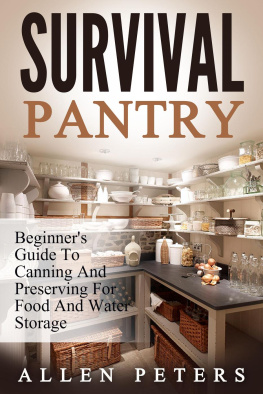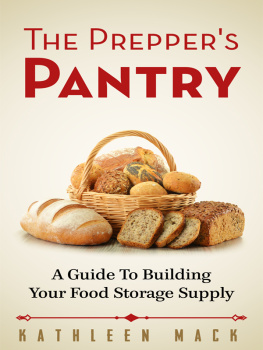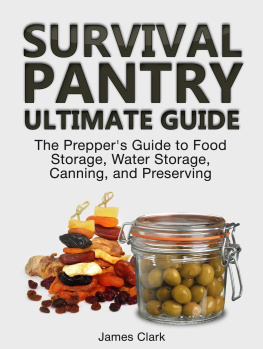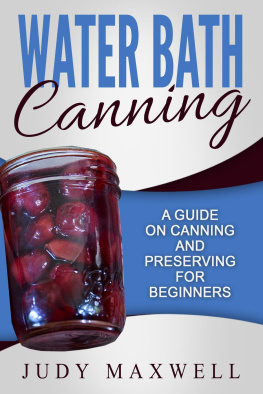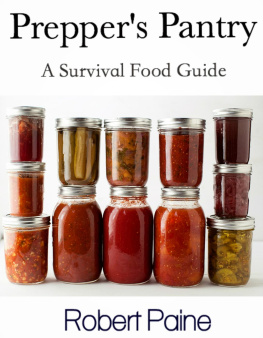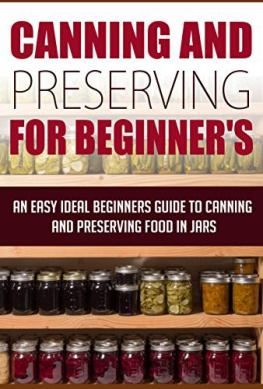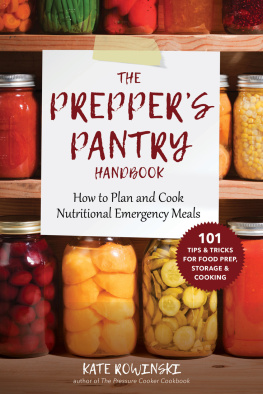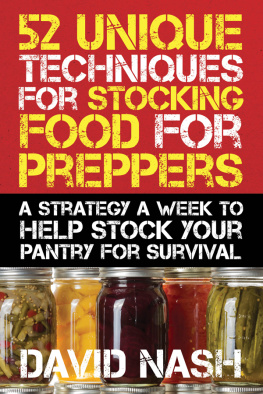While every precaution has been taken in the preparation of this book, the publisher assumes no responsibility for errors or omissions, or for damages resulting from the use of the information contained herein.
SURVIVAL PANTRY: BEGINNER'S GUIDE TO CANNING AND PRESERVING FOR FOOD AND WATER STORAGE
First edition. March 23, 2017.
Copyright 2017 Allen Peters.
Written by Allen Peters.
10 9 8 7 6 5 4 3 2 1
Survival Pantry: Beginner's Guide To Canning And Preserving For Food And Water Storage
Table of Contents
Introduction ........................................................................................................................ 3
Chapter 1: Must Have Items .......................................................................................... 4
Chapter 2: Canning .......................................................................................................... 7
Chapter 3: Storing Water ............................................................................................. 10
Conclusion: ....................................................................................................................... 14
Introduction
I want to thank you for choosing this book, Guide On Creating Survival Pantry and I sincerely hope you find it useful.
Disasters dont call before they come knocking on your door, so must always be prepared for them. You cannot avoid them or escape them. The only way to beat them is to arm yourself with proper knowledge and then using it to survive.
We live in the age of technology, where were not only exposed to natural disasters like earthquakes and storms, but also to mad-made disasters like terrorist attacks and nuclear explosions. We cannot do anything about them on an individual level, but we can surely protect our own from the aftermath of these disasters. This is why I am compiling this book.
It will give you all the information you need about creating your own survival pantry. You will learn about canning your food to preserve it, and you will also learn how you can preserve water to use it during times of crisis.
So go ahead and read on!
Chapter 1: Must Have Items
In this chapter, we will discuss what some must-have items for your survival pantry are. If you think youve got a perfect store of supplies, think again. Do you have enough food to last several days? Do you have all types of food items to stay healthy? Lets take a look at some important items that you should always have in a survival pantry.
- Water : If theres one thing we underestimate the need for, its water. And Im not just talking about drinking water. I am also including water used for personal hygiene, toilet usage, and other things. If you live somewhere hot, you will need more water. And if you have ill people or pregnant women in the family, you will need even more water. So you should have at least a gallon of water per person per day. Remember to never throw away any liquid, even a drop of it. Its too precious.
- Water purification supplies : When disaster strikes, you can take out water from a lot of places in the house and then purify it. You can save water in your water tubs in advance if you know about an upcoming disaster. You can also take out water from your water heater. In fact, if there are any streams, ponds or rivers nearby, you can use their water. But to use the water you get from these sources, you will need to purify it first. For this, you need to boil the water first of all, no matter what the source. After this, you can treat it with water purification tablets or unscented bleach. Use 16 drops of bleach per gallon of water and then let it stand for half an hour. Repeat the process if you dont smell a faint bleach odor, and if you still dont smell it, dont use that water. Look for another source.
- Disposable plates: You dont want to waste water washing your dishes because it is too valuable. So you should instead use disposable plates to eat in. Paper plates can be discarded easily by burning.
- Canned meats: You wont be able to use your freezer for very long if the electricity is out, so the meat wont be consumable after a few days. So after that, you will need a new source of protein. Learn to can your meat and keep it stored for rough days.
- Bouillons: You can buy processed bouillons from the market and store it. If you want to make your own, you can do that, too. Its a great addition to your pantry and is a source of many nutrients.
- Kitchen staples: Always keep things like salt, sugar, pepper, vinegar, yeast, baking powder/soda, powdered milk, and other spices in your pantry. Sometimes, these supplies can also be useful to create alternative health remedies.
- Coffees, Teas, Drink Mixes: Most people need their morning coffee or tea to properly wake up. Without it, their day goes by badly. So keep plenty of instant coffee or tea in your stores.
- Seeds for sprouting: A jar of sprouted seeds is packed with a lot of nutrition. You dont even need a garden or anything to sprout the seeds. A perforated lid and some Mason jars are enough to do the job. When nothing else is available to eat, you can sprout some seeds and eat them.
- Canned Vegetables and Fruits: Having veggies and fruits in your stock gives you a healthy assortment of nutrition. You can also use the juice from them as a substitute liquid.
- Dehydrated vegetables and fruits: Its a trade-off, because many dried foods take up less space but require water to be rehydrated. When it comes to jerky and dried fruits, you can eat them right out of the store.
- Cooking utensils: Consider a cooking utensil that doesnt require electricity. Utensils like the Crisis Cooker can use gas, charcoal, wood or any other fuel available for cooking.
- Hygiene items: Always keep things like toilet paper, soaps, dry shampoos, talcs, and other hygiene items in your store. These things are important when you need to survive for long periods of time. They make you feel human which is important, and they also prevent the spreading of diseases. Cleanliness is a must in these situations.
This is not an exhaustive list, but its supposed to give you some important items that you may not have considered earlier. Other than this, you should make a list of things you do on a daily basis, and then stock up on those things that you consume regularly other than the above mentioned things.
Extra Advice
- If youre storing things like rice and pasta, you should remember that these things are magnets to bugs. If you dont repack them in glass or food grade plastic containers, you can say goodbye to them. You should also keep Bay leaves in the containers.
- Always add a date to things you add in your pantry and follow the rule of First In First Out when consuming things. This makes sure you eat safe food for as long as possible.
- Always double-check your cans for dents or leaks, whether you buy them or can them yourself.
- Another thing you can do to store grains or flour is to put a small piece of dry ice in a clean, dry container, and then fill it with the food item. Then cap the container loosely and let the gases escape. The dry ice turns into CO2 and settles down, pushing out other gases. You can tighten the containers a while later. This will make sure all the bugs or eggs inside the grain are dead and that there is no moisture in the container.
Chapter 2: Canning
Canning is an important part of creating a survival pantry. You cant always have fresh food, so you need to preserve it for times of disaster. In this chapter, we will discuss canning and how you can use it to preserve food for when a disaster strikes. When surviving in the wild, you cant always depend on hunting. And even if you find a really beefy animal, you wont be able to eat everything in one go. So lets learn about canning.

